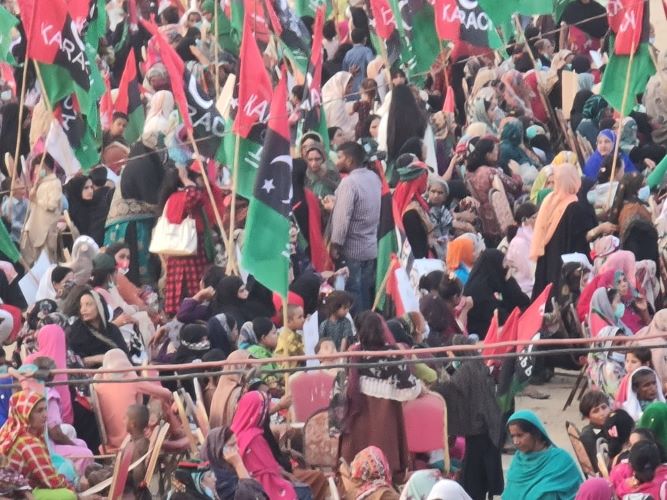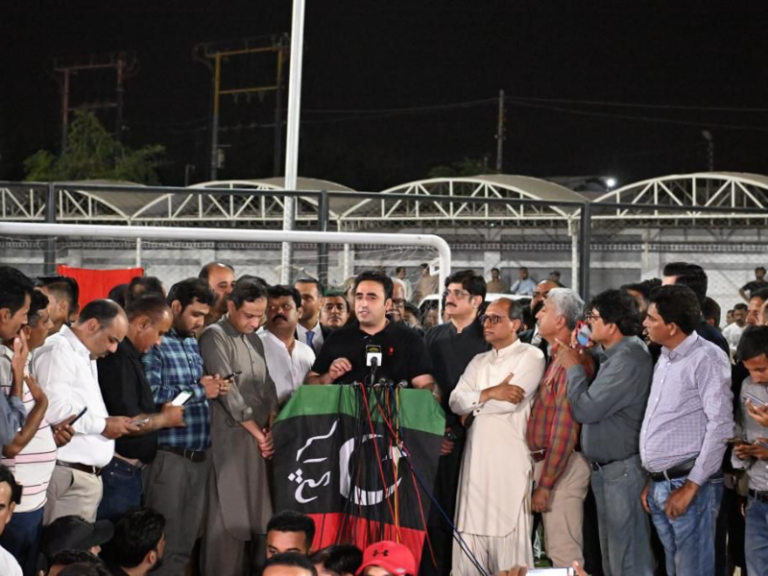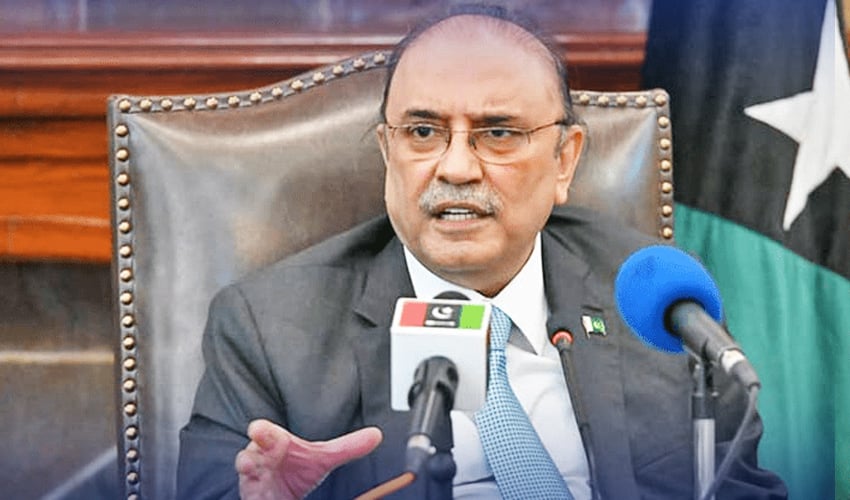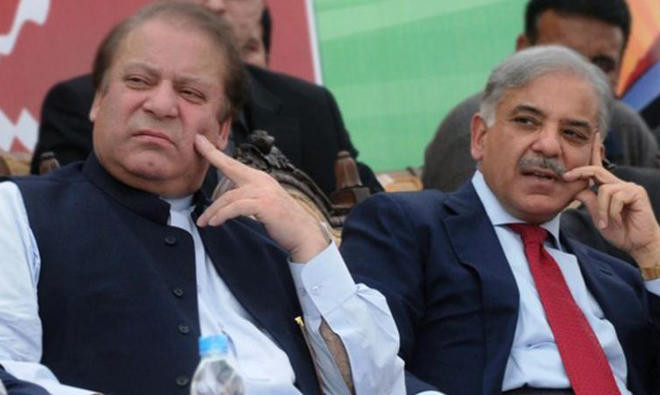
The PPP’s historical cooperation with the establishment may work in its favor however the landscape remains uncertain
Dr. Shahban Sahito
The political landscape in Pakistan is a dynamic and ever-changing one, with key players often shifting their strategies and positions in response to changing circumstances. The Pakistan People’s Party (PPP), led by Bilawal Bhutto Zardari and his father Asif Ali Zardari has recently made bold claims about forming the government after the 2024 general elections, marking a significant shift in their political rhetoric. This change in tone has raised questions about the PPP’s prospects and the factors that may have influenced their newfound confidence.
The Evolution of PPP’s Political Strategy
The PPP’s recent statements about forming the government represent a remarkable shift from their earlier stance. Just a week ago, Bilawal Bhutto was vocal about his party not being given a level playing field in the political arena. He had even referred to Nawaz Sharif as a “Ladala” (favorite) of the establishment, implying that he was favored by the powerful military establishment. However, within a matter of days, both Bilawal and his father, Asif Ali Zardari, expressed their confidence in the PPP’s chances of forming the government.
 The internal dynamics of the PPP have been the subject of much discussion. While Bilawal holds the position of chairman, his father, Asif Ali Zardari, is the co-chairman, and this has led to speculation about who wields more power within the party. It is often observed that Bilawal becomes more active during election seasons. The differences in opinion between the father and son are not uncommon. They sometimes give the impression that Bilawal is asserting more influence over the party’s decisions, but this may not always hold true. Zardari has consistently played a central role in key party decisions, including the selection of candidates for various constituencies, organizational matters, and alliances with other political parties. Zardari’s reputation as a skilled manipulator in political matters has earned him the nickname “Aik Zardari Sub Pe Bhari” (Zardari is above all).
The internal dynamics of the PPP have been the subject of much discussion. While Bilawal holds the position of chairman, his father, Asif Ali Zardari, is the co-chairman, and this has led to speculation about who wields more power within the party. It is often observed that Bilawal becomes more active during election seasons. The differences in opinion between the father and son are not uncommon. They sometimes give the impression that Bilawal is asserting more influence over the party’s decisions, but this may not always hold true. Zardari has consistently played a central role in key party decisions, including the selection of candidates for various constituencies, organizational matters, and alliances with other political parties. Zardari’s reputation as a skilled manipulator in political matters has earned him the nickname “Aik Zardari Sub Pe Bhari” (Zardari is above all).
 To understand the recent change in the PPP’s stance, it’s crucial to look back at the political landscape since 2021. The Pakistan Democratic Movement (PDM) was conceived by the PPP and Zardari, and it remained largely inactive until the PPP threw its weight behind it. The alliance gained momentum when the PPP began actively supporting the PDM’s goal of ousting Imran Khan’s government. Zardari played a pivotal role in uniting various opposition parties, even those known for their close ties with the establishment. This alliance successfully brought a vote of no confidence against the Imran Khan government, resulting in the installation of Shahbaz Sharif as the new Prime Minister. However, it’s important to note that this success was achieved with the support of pro-establishment elements and parties, which indicates that the establishment played a key role in these political developments.
To understand the recent change in the PPP’s stance, it’s crucial to look back at the political landscape since 2021. The Pakistan Democratic Movement (PDM) was conceived by the PPP and Zardari, and it remained largely inactive until the PPP threw its weight behind it. The alliance gained momentum when the PPP began actively supporting the PDM’s goal of ousting Imran Khan’s government. Zardari played a pivotal role in uniting various opposition parties, even those known for their close ties with the establishment. This alliance successfully brought a vote of no confidence against the Imran Khan government, resulting in the installation of Shahbaz Sharif as the new Prime Minister. However, it’s important to note that this success was achieved with the support of pro-establishment elements and parties, which indicates that the establishment played a key role in these political developments.
During the PDM government and Shahbaz Sharif’s tenure as Prime Minister, efforts were made to negotiate the return of Nawaz Sharif to Pakistan. The deal was in progress, and Shahbaz Sharif was successful in bringing his elder brother and party leader back to the country. In the final months of the PDM government, PPP leadership, particularly Asif Ali Zardari, was unaware of the unfolding developments. They knew that Nawaz Sharif was returning but may not have been confident that he would receive establishment support to form a government. This uncertainty likely contributed to the stress and dissatisfaction among PPP leaders regarding the situation favoring the Pakistan Muslim League-Nawaz (PML-N).
 The PPP’s stance changed as they observed shifting political realities. They demanded that elections be scheduled, reversing their earlier position when they were part of the Council of Common Interests (CCI) advocating for elections based on the latest census data. This shift in stance suggests that the PPP may have received signals or assurances that influenced their decision.
The PPP’s stance changed as they observed shifting political realities. They demanded that elections be scheduled, reversing their earlier position when they were part of the Council of Common Interests (CCI) advocating for elections based on the latest census data. This shift in stance suggests that the PPP may have received signals or assurances that influenced their decision.
Challenges and External Factors
Several factors and external developments have the potential to impact Pakistan’s domestic politics and, consequently, the PPP’s prospects in the 2024 elections. These factors are worth considering when assessing the party’s chances.
Afghan Refugees and International Pressure: The federal government has been focused on repatriating Afghan refugees to Afghanistan. This policy has raised concerns, and there may be backlash against it. The international community, including the United States, has urged Pakistan not to take this step, creating a complex situation. The recent release of a list of 25,000 individuals living in Pakistan who the US wants to take to America rather than returning to Afghanistan has further complicated the situation. Pakistan’s response to this list and the unfolding developments will have implications for its domestic politics.
Middle East Crises and Regional Implications: The ongoing conflict between Israel and Palestine, and the possibility of this crisis spreading throughout the Middle East, could have far-reaching implications. Iran’s perceived support for groups like Hamas and Hezbollah has positioned it as a key player in this regional turmoil. Western countries consider these groups as terrorist organizations supported by Iran, making Iran a primary threat to Israel and Western interests in the region. If this conflict escalates to involve Iran, it could have repercussions for Pakistan as well.
Security Challenges: The security landscape within Pakistan is complex, with threats from the Afghanistan Taliban and Tehrik-i-Taliban Pakistan (TTP) creating cross-border security concerns. Recent attacks on an air force base and in terror attacks in Baluchistan underscore the security challenges the country faces. These security issues are a critical consideration in the context of domestic politics, as they may influence the establishment’s preferences and decisions.
The PPP’s Role in National Security
Historically, the PPP has played a significant role in supporting the establishment during times of security challenges. This track record is an essential factor that could favor the PPP’s prospects in the 2024 elections. For example, during the military operation in East Pakistan in 1971 and multiple other security operations in various provinces of the country, the PPP has been a key ally to the establishment. This history of cooperation may influence the establishment’s calculations regarding the PPP’s suitability to address security threats. In the tumultuous security environment, no other party may be as well-positioned as the PPP to work alongside the establishment to manage these challenges effectively.
The Establishment’s Influence
The intricate relationship between the establishment and various political parties in Pakistan is a recurring theme in the country’s politics. While the PPP is currently expressing confidence about forming the government, it’s essential to acknowledge that the establishment often holds a “B-Plan” and keeps its intentions closely guarded. The establishment’s shifting strategies and preferences can significantly impact the political landscape.
The establishment has historically maintained a complex relationship with the various political players. For instance, Nawaz Sharif’s Pakistan Muslim League-Nawaz (PML-N) and the establishment have had a history of both cooperation and conflict. The establishment’s role in Pakistan’s political affairs is often masked, creating an aura of ambiguity that keeps political parties guessing.
The Fluid Nature of Pakistani Politics
The recent shift in the PPP’s political rhetoric is reflective of the fluid and ever-changing nature of Pakistani politics. While the party expresses confidence about its prospects in the 2024 elections, the complex mix of security challenges, regional developments, and the establishment’s influence makes it difficult to predict the outcome with certainty.
The PPP’s historical cooperation with the establishment during times of security challenges may work in its favor. However, the landscape remains uncertain, and the establishment’s preferences may shift as circumstances change.
As we move closer to the 2024 general elections, the interplay of these factors will continue to shape Pakistan’s political dynamics. Only time will tell whether the PPP’s claims of forming the government will materialize or whether the political landscape will witness further twists and turns.
_________________
 Dr. Shahban Sahito is Assistant Professor at Department of International Relations, University of Sindh, Jamshoro. Email: shahban.sahito@usindh.edu.pk
Dr. Shahban Sahito is Assistant Professor at Department of International Relations, University of Sindh, Jamshoro. Email: shahban.sahito@usindh.edu.pk
There are hard times for if not all but two major political players that are PPPP and PMLn. Both claim and try to become favorite of the establishment, but owing to the ever changing nature of establishment overtures its difficult who reaches to the throne.
Yes, the two parties have remained victimised of the establishment but less they have learn from experience. Why they don’t learn and not faint of experience because one party is not believing on the others. The main reason is two parties have different ethnic background,pmln is not believing detaching itself being a Punjabi nationalist party and ppp is labelled a Sindhi party by Punjabi. This ideological fault line of the parties have dragged them on the pathway of ruling establishment.